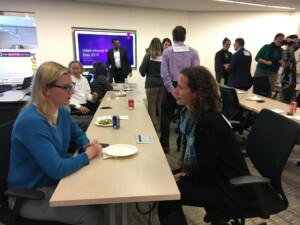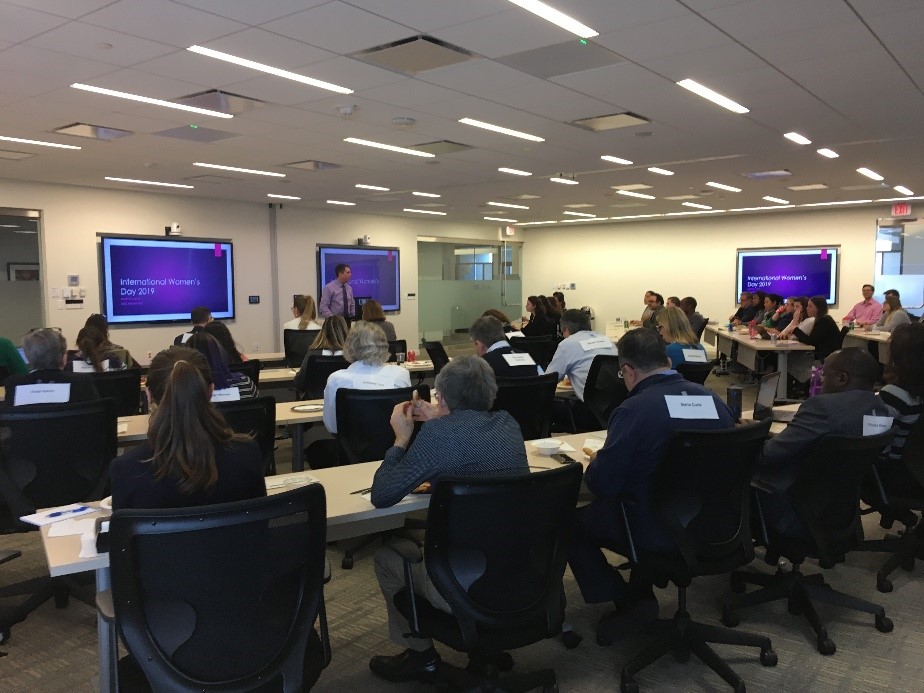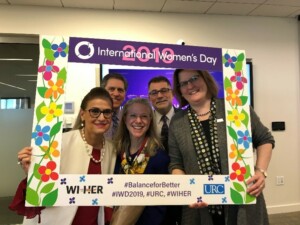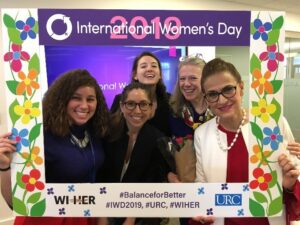Reflecting on International Women’s Day
By Kelly Dale, Gender Specialist
“She’s awesome!” “I love her!” “Wow! I need to learn more about her.”

These were the exclamations heard around the room as 60 colleagues and friends filed in with plates of pizza and names of famous women taped to their backs. There were exclamations of joy and recognition, and also of intrigue and curiosity to learn more about some of these women. The energy was electric—it was a true celebration of women. It was International Women’s Day.
Last Wednesday (March 6, 2019), WI-HER and URC co-hosted an event for International Women’s Day to celebrate the accomplishments of women (and men) and to discuss the importance of gender equality. We WI-HER brought together colleagues from both organizations with speakers from diverse backgrounds and organizations, including USAID’s Deputy Assistant Administrator for Global Health, Ms. Kerry Pelzman. The speakers were diverse in perspective and tone—we heard personal stories of resilience, anecdotes of shifting perspectives, and lessons on technical improvement.
Jay Wechsler, URC’s President, started the event by acknowledging the excellent turnout for such an important and relevant topic.

Deputy Assistant Administrator Pelzman spoke about USAID’s commitment to gender equality and to institutionalizing gender in their push for sustainability, ownership, and self-reliance. Ms. Pelzman emphasized that women and girls are poised to be key drivers of development, economic growth, and good governance, but they need to be empowered with equal rights and opportunities. This is the focus of the new Women’s Global Development and Prosperity Initiative, which is a government-wide effort that promotes women’s economic development with the understanding that if you invest in women, this investment is often reinvested producing a multiplier effect of positive impact.
Dr. Taroub Faramand, Founder and President of WI-HER, told her amazing story of resiliency. She explained how she went from being a girl in Palestine who was told not to dream, travel or study medicine, to becoming a physician and founder of a thriving woman-owned small business. Dr. Faramand told the group that she was celebrating all the people who supported her, those who blocked her way and challenged her to innovate, and her family that inspires her every day.

Dr. Margaret Greene, President of GreeneWorks, spoke about the connections between gender, health and development. She discussed the need to consider and engage every person- women, men, boys, and girls- in efforts for gender equality.
Dr. Rashad Massoud, Director of the USAID Applying Science to Strengthen and Improve Systems (ASSIST) Project, Chief Medical and Quality Officer, and Senior Vice President at URC, shared his journey of understanding the importance of integrating gender in quality improvement programs.
Finally, Mr. Ronnie Czyz, International HR Manager at URC, brought the conversation full circle by talking about women’s employment, empowerment, and access. Mr. Czyz opened our eyes that gender equity may seem easy and attainable, but surprised the audience with examples where again and again we fall short—in the countries where we implement development programs and here in the United States. He encouraged the group to be creative in finding solutions for greater gender diversity.
Throughout the event, four major themes emerged:
Real change is possible only if we change together
Dr. Greene explained, “everybody is interconnected, and so social change is only possible if everybody participates.” She explained how she views gender as a system of relationships and unspoken rules in which everyone—males and females—participates and suffers from. As a result, we need widespread support to change these rules and avoid any backlash or violence. Dr. Greene said that she believes personal experience to be fundamental and relevant to this change and a reason why events like this one are so important and noted how impressive it was that both women and men – all of different ages, perspectives, and nationalities – had come together in a shared enthusiasm to learn about gender integration challenges, successes and to continue to advocate for gender equity in health and across all sectors.
Data is essential
Throughout the event, it became abundantly clear that data has the power to transform understanding and impact actions. Ms. Pelzman spoke about the significance of including the economic gender gap in the new USAID metrics for self-reliance. Dr. Massoud discussed how he was initially unsure of the importance of gender work until he saw sex-disaggregated data for health access and outcomes. When he saw how men were seeking care at significantly lower rates compared to women, he was convinced to collect sex-disaggregated data and address gender in every program. Dr. Greene encouraged the group to think about the biases in our data—we must consider whom we collect data from and what assumptions we make based on this data. When conducting field work in Brazil, she realized that the historical approach to data collection involved only talking to women, assuming their situations applied to men as well. When she expanded her sample to include men, she got much richer and interesting data and saw the importance understanding both men and women’s unique experiences and varied opportunities.
Women are beneficiaries and providers
Ms. Pelzman and Dr. Faramand both discussed how women are central to global health both as beneficiaries of the health system and as providers of care. Ms. Pelzman told anecdotes of the power of women in health—that women are often on the frontlines of the health sector but lack access to opportunities, and face stigma and violence. In Afghanistan, community midwives historically had limited opportunities, but with USAID support they played a pivotal role in driving down maternal mortality rates. In Palestine, Dr. Faramand was inspired by the people she served as a young doctor, such as the young women who put their lives at risk for childbirth. She spoke about how the opportunities that were provided to her changed her life. Today, WI-HER’s approach involves enabling community members to identify challenges, gaps and opportunities in their own communities. WI-HER’s work allows them to be both the frontline providers and the primary beneficiaries.
Promoting gender equality is not easy

When Dr. Faramand was a young girl in Palestine, people told her that she could not succeed and become a doctor. But her mother inspired her, and her parents encouraged her, and now she is an accomplished doctor and president of a thriving small business. But even today, she deals with push back from people who do not think that gender is important to development work. Mr. Czyz, on the other hand, grew up seeing his mother run the house and thinking that gender inequality was thing of the past. When he entered the working world, he was shocked to see that gender inequality is not only still prevalent, but that it is difficult to address. This difficulty is the reason that WI-HER and URC hosted this event to discuss challenges, successes, and lessons learned. It is why URC partners with WI-HER on so many projects, to be sure that gender is fully and meaningfully addressed. And it is because of these challenges, as Ms. Pelzman explained, that USAID makes gender a priority and dedicates significant resources to women’s empowerment and gender equality.
Throughout the event, participants shared stories about professors, mothers, fathers, supervisors, and friends who encouraged them to pursue their dreams, break down barriers, and strive for gender equality. I personally was inspired by the amazing women and men who organized the event and shared their personal stories and professional advice.
WI-HER thanks URC for hosting this wonderful event and USAID and GreeneWorks for their valuable contributions and for making the event more interesting.
WI-HER, LLC (Women Influencing Health, Education and Rule of Law) is a woman-owned small business that partners with international donors, national governments, non-governmental organizations and others to identify and implement creative solutions to complex development challenges to achieve better, healthier lives for women, men, girls, and boys. Founded by Dr. Taroub Harb Faramand in 2011, WI-HER, LLC works to integrate gender through contextualized, adaptable, and systems strengthening methods that can be seamlessly integrated into ongoing and new programs. WI-HER is committed to ensuring equal opportunities for women, men, girls, and boys, as well as all other vulnerable groups, including LGBTQI+ people.